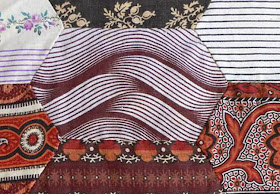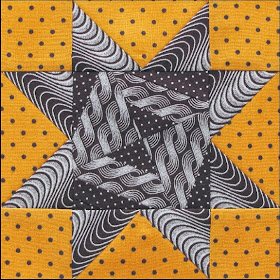Reproduction star by Becky Brown.
The star is a version of an eccentric or excentric print. Either spelling is correct. Americans spell it with two C's today. You'll see below excentric as an alternative.
A vintage excentric print, about 1880.
One extremely popular style of cylinder print featured fine geometric figures
with jagged or wavy distortions---"a particular style of design known by
the name of 'excentrics,' in the production of which England surpasses every
other nation in the world," according to a proud printer testifying to the
British Parliament in 1840.
Fine, wavy lines in a vintage quilt about 1830.
The Parliamentary report was illustrated with examples.
Eccentric prints were the exception. Calico printer John Brooks testified he'd been in the business for thirty years and while "spots had been seen since time immemorial," two eccentric prints were "the only real original patterns I recollect since I have been a calico printer." He mentioned one called Diorama created by accident when a parallel stripe creased in the roller, "producing a new and unexpected effect. " Rather than discarding the misprint, the enterprising mill owner was inspired to create a new fad for jagged stripes.
Two very popular variations called Hoyle's Wave (1822) and Lane's Net followed.
Eccentric prints, an English specialty, were probably based less on accident and more on technological advances in lathes and other metal tools. The word excentric means odd or erratic but it also refers to geometric ellipses and circles with centers at different points (as opposed to concentric circles.)
Lane's Net in a nine-patch about 1870
Variations on Lane's net from my collection.
The largest piece is 20th-century.
A lilac version from an 1870-1890 quilt
Vintage illustration of some eccentric prints.
A Parisian swatch book from 1825
shows an excentric print at the bottom here.
Toolmakers developed metal lathes with so-called excentric chucks that could create mechanical drawings of endless lines, first used to engrave intricate bank note backgrounds.
Illustration of "Fancy Turning" from about 1860
The English calico printers adapted the technology as well as the name.
Americans quilters continued to use eccentrics in their quilts through the early 20th century.
Reproductions


A variation of Hoyle's Wave
What to do with your Stack of Stars?
Update the look by staggering them in a border.
One More Thing About Eccentric Prints
http://barbarabrackman.blogspot.com/2011/10/excentrics-in-nebraska.html
Lane's Net was popular in madder-style shades.
Americans quilters continued to use eccentrics in their quilts through the early 20th century.
An eccentric excentric from about 1880
More eccentricity by Becky Brown.
Her repro print is a South African fabric
featuring stripes of different period excentrics.
Reproductions
One of Jeanne's many great repros with a Hoyle's Wave
Nancy Swanwick's repro block with an eccentric center.
Reproduction block by Becky Brown
They used the same recent print. Anyone remember the line?
Nancy and Jeanne say:
"Mourning Grays by Carrie Quinn"
From the Mill Book 1892 collection.
Two of Nancy Gere's
Kathy Hall for the Southcott Quilt, reproduction
of an 1808 quilt at the Winterthur Museum
Mary Koval for Palampore
And Mary's Cynthia
Here's an old reproduction print you may still have...

Jenny Zutphen's repro block includes the fabric Terry Thompson and I did for Moda
based on the document print below.

A variation of Hoyle's Wave
I found this fussy cut example of our repro in a hexie at the
Quilts in the Barn site.
What to do with your Stack of Stars?
Update the look by staggering them in a border.
Medallion by Kathy Ronsheimer
She turned each star block
into a rectangle by adding a strip of background.
Star over the Rockies by Lolly Platt using a
Mountain Vistas pattern by Judy Martin
I first noticed this contemporary use of staggered stars in a border by Judy Martin.
She and Marsha McCloskey included it in their 1995 book
Pieced Borders.
For our 6" stars you'd want to add a strip to
each star cut 6-1/2" x 2". The block now finishes to 6" x 7-1/2".
Rotate the rectangular blocks 180 degrees to get the dancing stars.
Stairway to the Stars Block of the Month designed by Winnie Fleming
Maureen Gore Brooks, Celtic Hearts
Turning your square star into
a rectangle could lead anywhere.
Another Judy Martin quilt
It's sort of like the excentric lathe.
Excentric prints, excentric quilts.
Prints in a swatchbook from France about 1830
Combination excentric/serpentine stripes
The astounding popularity of excentric designs in the 1830s shows the importance of novelty to the burgeoning cotton printing business, which was becoming an economic force. By the 1840 Parliamentary hearings the members heard that the taste for excentrics "is like everything else in the trade, transient and temporary…The passion for it is over…The style was exhausted and the public required something new."
But excentric prints weren't the only strange prints. Printers often complained about the public taste for novelty (it seems to be a built in human need.) During the early decades of roller printing they created some truly novel and eccentric designs.
An odd print from an 1837 swatchbook.
The Powerhouse Museum has the swatches from this sample book online here:
Over on the left on the main page see if you can read the list of books and click on the 1837 button.
That book shows many eccentric prints (in the sense of odd or strange).
The search for novelty seemed to be driving the roller printing
industry at the time.
These are not the kind of prints likely to be reproduced.
The market would be minuscule--- you guys and me.
See another post about early excentrics:
Read more about the British hearings on copyright and excentric prints here





































Wow! Very interesting! I had never heard of eccentric prints. This will be a challenging week.... now let me go search my repro stash! LOL
ReplyDeleteThank you for the link to the powerhouse site. I'll be looking at the swatches all day! Such eye candy.
ReplyDeleteSuch an interesting print--I've seen them but didn't know what they were called. Thank you again for this sharing your knowledge in this great series, I am learning so much.
ReplyDeleteI can't wait to dig through my stash!
ReplyDeleteWow,great post,just realize I have some eccentric prints .Thanks for great pics!!
ReplyDeleteOh my, that's a Hoyle's Wave rather than an Ombre! So I'm ahead one already this week. I do have more eccentric prints ... and now I'll be hunting for another rainbow fabric also. Thanks for another good Wednesday :)
ReplyDeleteP.S. I just started rummaging through my stash, and I have the purple-ish fabric you asked about: the selvage says "Mourning Grays by Carrie Quinn for Newcastle Fabrics."
ReplyDeleteI'm learning something new every week - Thanks Barbara!
ReplyDeleteWendy in NH
ReplyDeleteTo me those look like what we called Op Art in the 60's.
Hmm. Wondering whether the chevron design from the Ladies' Album line would be considered an eccentric print? Or are they usually monotone?
ReplyDeleteHeading to my sewing room to see what I have. Kim Diehl has one in her latest Farmhouse collection. What an interesting post today, thanks for sharing your extensive research with us!
ReplyDeleteThanks for the swatchbook link (and all the other great info.) I can't wait 'til I have some time to look through them all.
ReplyDeleteI agree with Jeanne's comment that the purple-ish print in the center of my block is Mourning Grays by Carrie Quinn for Newcastle Fabrics. I have it in that color and also a slate/black.
ReplyDeleteThis is so interesting - I have loved these prints but now I know what to call them!
ReplyDeleteI really enjoy reading your blog. So much great info. Thanks!
ReplyDeleteWhat an interesting print for this week. Also interesting is the variant spelling of "eccentric". We learn so much on your blog. In my opinion, blogs/sites with learning and other useful, theme-related info are the best. I also hear that they rank higher with the major search engines like Google. Your blog is just as its name states: Civil war quilting and information :)
ReplyDeleteHoyle's net and similar excentrics seem kind of like the tone on tones of today?! The provide the contrast needed for other moe complicated desined fabric. I think it's veryt rue what yous said that there is a need for novelty! Geez I have a big stack of novelty fabrics...mostly unused! But I still enjoy looking at them, it's kind of like collecting stamps or something?!
ReplyDeletegreat fabrics here... i am never forgotten the African Wax Print its really amazing.
ReplyDeleteI really enjoy reading your blog.It's full of content n African fabrics picture .Its very help full to know about African fabrics. Thank you so much!
ReplyDeleteThank you for sharing this article. I found some excellent fabrics from Spandex Collection in NYC near me which was a nice weight, not too beefy.I hope you would also like those fabrics.
ReplyDeleteStretch Sequins
Glitter Stone
Designers Lace
Stretch Lace
Printed Spandex